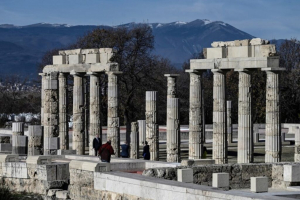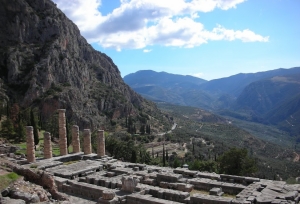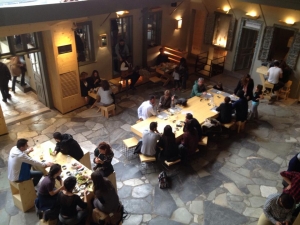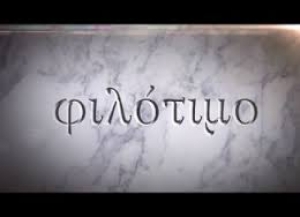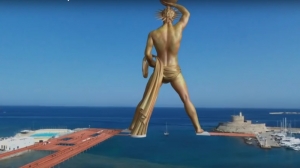Ancient Greece typically comes to mind as a beacon of intellectual achievement, democracy, and high culture. For centuries, it has inspired countless books, movies, and political philosophies. Yet, if we take a closer look at the reality of Ancient Greece, we will see that it was far more complex—and often much less ideal—than we’d like to believe.
Yes, Ancient Greece laid the groundwork for many modern concepts, but day-to-day life at the time was shaped by its own contradictions—exclusive politics, rigid gender roles, and philosophical ideas that wouldn’t necessarily align with many of the values of today.
This article explores some of the things about Ancient Greece that over time have been clouded by oversimplification, and romanticization with an intention to shed light on the importance of context, and seeing reality from its many perspectives.
1. Democracy: More Exclusive than Inclusive
One of the most common misunderstandings is the notion that Athens, often called the birthplace of democracy, was a shining example of "rule by the people." While it’s true that Athens developed the earliest form of democratic governance, this system was far from inclusive.
The idea that everyone in Athens could vote is far from the truth. In reality, only male citizens—about 10-20% of the population—were allowed to participate. Women, slaves, and foreigners were excluded from the political process. Athenians took their civic duty seriously, but democracy as they practiced it was a privilege enjoyed by a small minority. Even among men, participation required wealth, time, and education, leaving many citizens at a disadvantage.
This narrow version of democracy might surprise modern advocates of equality and representation. It reminds us that while Athens planted the seeds of democratic governance, it was quite different from the inclusive model we think of today.
2. Gender Roles: The Myth of the 'Progressive' Greek Woman
In modern portrayals, particularly in pop culture, Greek women are often depicted as powerful figures, standing shoulder-to-shoulder with men. However, the reality of their lives was far more restricted.
In most Greek city-states, women were expected to live highly sheltered lives. Their primary roles were within the household, where they were responsible for child-rearing and managing the domestic sphere. Athenian women were even barred from owning property independently or appearing in court without a male representative. Marriage, often arranged, marked their transition from being under their father’s authority to that of their husband.
Sparta, often depicted as an outlier, allowed women more freedom, especially in terms of physical training and property rights. However, even Spartan women were largely excluded from the political sphere. The idea of Greek woman being “liberated” was not ancient reality.
3. Philosophy: The Dark Side of the Thinkers
Names like Socrates, Plato, and Aristotle are synonymous with the birth of Western philosophy. We often imagine Ancient Greece as a golden age of intellectual freedom, yet the reality was far more complicated.
The philosophical achievements of these thinkers came at a time when critical thinking could be dangerous. Socrates, for instance, was sentenced to death by his fellow Athenians for "corrupting the youth" and impiety. His method of questioning authority and established norms was seen as a threat to the state. Meanwhile, Aristotle’s philosophy, which influenced Western thought for centuries, promoted views that we’d find troubling today. He argued that some people were “natural slaves,” thus justifying slavery as a natural and necessary part of society. He also believed women were biologically inferior to men—a perspective that was widely accepted in Greek culture at the time.
While Ancient Greek philosophy laid the groundwork for critical thinking and ethical debates, it was also deeply intertwined with the societal prejudices of its time.
4. Art and Architecture: Not All as Pure as Marble
The image of Ancient Greece is often one of stark white marble sculptures and temples, which over time created notions of purity and perfection. However, at the time of their creation, Greek temples, statues, and buildings were vibrantly painted in bright colors. Over time, these pigments faded, leaving the pristine white marble we’re familiar with today.
In fact, the Ancient Greeks adored color. Archaeologists have discovered traces of red, blue, and gold on many ancient statues and temples. The Parthenon, the enduring symbol of classical architecture, was once decorated with bright murals and ornaments.
5. Greek Mythology: Not Just Epic Heroes & Gods
Greek mythology is a treasure trove of epic battles, powerful gods, and heroic quests. Today, we often focus on figures like Zeus, Athena, and Hercules, celebrating how strong and cunning they were. Yet, these myths were more than just entertainment for the Greeks—they were a way to explain the chaotic and often brutal realities of their world.
The gods of Olympus were not benevolent figures—they were capricious, vengeful, and often unjust. Zeus, the king of the gods, frequently abused his power, and many myths revolve around the tragic consequences of the gods’ whims. Take the story of Prometheus, who was punished for giving fire to humanity, or the tale of Icarus, whose wings melted when he flew too close to the sun. These stories remind us that the Greeks didn’t view their gods as moral role models, but rather as forces to be feared.
Additionally, the lives of many mythological figures, such as women like Medea and Pandora, reflect the misogyny of the time, portraying them as destructive or foolish. These stories were not just allegories—they were reflections of the Greek worldview at the time.
Ancient Greece Within Context
While Ancient Greece has gifted the world with extraordinary ideas and innovations, it's important to remember that these were ancient times, far removed from the standards and ideals we hold today. In many ways, the Greeks were progressive for their era, pioneering democracy, philosophy, and art that have had a lasting influence on Western civilization. However, we should acknowledge their achievements without ignoring the complexities and limitations of society at that time. By acknowledging both the progress and the imperfections, we gain a more nuanced understanding of reality.



